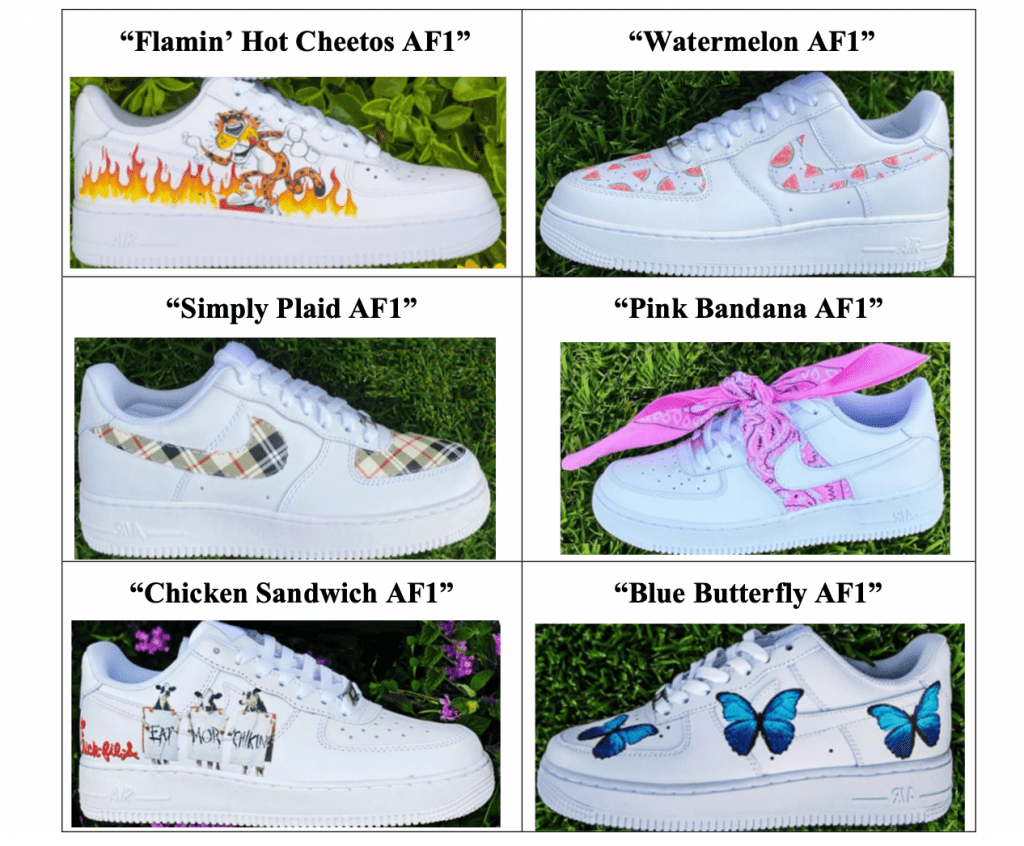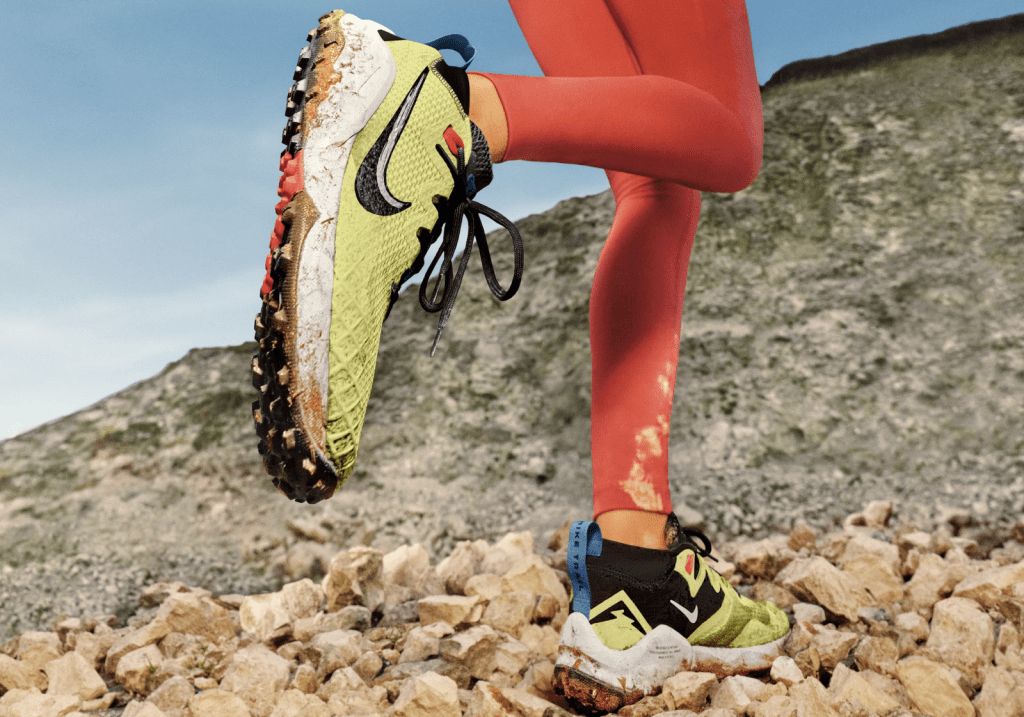A California federal judge is calling on Nike and Customs By Ilene d/b/a Drip Creationz, the sneaker customizer that Nike sued back in July 2021 for trademark infringement, dilution, and counterfeiting, to file supplemental briefings that center on the first sale doctrine, one of the defenses cited by Drip Creationz. In an order on August 14, Judge John Holcomb of the U.S. District Court for the Central District of California directed Nike and Drip Creationz to provide him with briefings applying the first sale doctrine in light of the U.S. Court of Appeals for the Ninth Circuit’s decision in the Bluetooth SIG Inc. lawsuit and other applicable precedent from the federal appeals court.
In the case at hand, Nike is accusing Drip Creationz of selling outright counterfeit sneakers that bear its well-known branding, such as its Swoosh logo and Air Force 1 marks. More interestingly, Nike also claims that the Southern California-based sneaker company is offering up otherwise authentic Nike sneakers, which it “materially alter[s] … in ways that Nike never approved or authorized.” Specifically, Nike alleges that Drip Creationz modified the sneakers to include to “fake and unauthorized Nike Swoosh designs, as well as third party trademarks and protected images,” such as a pattern that mirrors Burberry’s trademark-protected check, Frito-Lay-owned Cheetos’ Chester Cheetah character, Travis Scott’s Astroworld graphic, and Chick-fil-A’s stylized word mark, thereby, transforming formerly-authentic Nike sneakers into infringing footwear.

In response to Nike’s complaint, Drip Creationz set out an array of affirmative defenses in connection with its sale of the modified sneakers, including the first sale doctrine. The defendant asserted that its sale of modified sneakers that it purchased from Nike and/or authorized Nike retailers “amount[s] to a resale by the first purchaser of the original product and is, thus, protected under the first sale doctrine and does not constitute trademark infringement or unfair competition.”
First Sale & the Ninth Circuit
Ahead of the filing of their briefs, Nike’s is due on August 25 and Drip Creationz’s responsive supplemental brief is due on September 7, a look at the Ninth Circuit’s treatment of the first sale doctrine – especially in Bluetooth SIG Inc. v. FCA US LLC – is worthy of attention. In its April 2022 decision in Bluetooth SIG Inc., a panel for the appeals court clarified the applicability of the first sale doctrine, which generally allows for the resale of a trademark-bearing item after it has been released into the market by the trademark owner, even if the subsequent sale is done without the trademark owner’s consent.
In Bluetooth, the Ninth Circuit sided with Fiat-Chrysler Automobiles (“FCA”), holding that its use of the Bluetooth trademark falls within the bounds of the first sale doctrine. Bluetooth filed suit against FCA, arguing that it infringed the mark by using it in its cars and in corresponding product materials. Reversing an earlier decision from a federal district court in Washington, which granted summary judgment to Bluetooth, the Ninth Circuit held the first sale doctrine applies when a trademark-bearing product or component is incorporated into a new product.
According to the Ninth Circuit, which relied on the Supreme Court’s ruling in Prestonettes v. Coty and its own decision in Enesco Corp. v. Price/Costco Inc., the applicability of the first sale doctrine goes beyond the mere stocking, displaying, and selling of a trademark-bearing product after its initial sale, and may extend to situations in which a trademark-bearing product or component is incorporated into a new end product “so long as the seller adequately discloses how the trademarked product [or component] was incorporated.”
In Prestonettes, the defendant was a cosmetics manufacturer that purchased powder manufactured by the plaintiff, and then “subjected it to pressure, added a binder to give it coherence and sold the compact in a metal case.” The Supreme Court held that the defendant was not barred from using the plaintiff’s mark to alert consumers that the trademarked product is part of a “new and changed” product as long as the public was “adequately informed” who modified the powder. Thereafter, the Ninth Circuit applied the first sale doctrine in Enesco, in which it held that the first sale doctrine protected a retailer that resold porcelain dolls in allegedly inadequate packaging to the extent that the repackaging was disclosed. The court explained that if the public was “adequately informed that [the defendant] repackaged the figurines and the figurines were subsequently chipped, the public would not likely be confused as to the cause of the chipping.”
With these cases in mind, the Ninth Circuit remanded the Bluetooth case for the district court to address “whether FCA adequately disclosed its relationship with, and qualification to use, Bluetooth technology,” and the case ended up settling shortly ahead of trial.
Next Steps in Nike
As for what the Ninth Circuit’s decision in Bluetooth (and the outcomes in the other cases) means for Nike’s case against Drip Creationz, that will clearly depend, at least in part, on the extent to which the defendant adequately disclosed how the trademark-bearing products – the Nike sneakers – were used or modified to create its “new” products. (This assumes that the Drip Creationz sneakers are, in fact, “new” products,) Also at issue are the modifications that Drip Creationz makes to the Nike sneakers, which go so far as to include others’ trademarks (without authorization) and potentially-copyright-protected (and thus, infringing) imagery, and almost certainly make the sneakers “materially different” from the ones that Nike first sold. (It is worth noting that the likes of Burberry, Chick-fil-A, Cheetos-owner Frito-Lay, and co. have not lodged infringement suits against the sneaker customizer.)
Nike makes no mention in its complaints of whether Drip Creationz made any disclosures about the nature of its sneakers and its use of the Nike trademarks, but it does allege “numerous instances of actual consumer confusion,” which suggest that any disclosures that Drip Creationz may have made, were not terribly effective. Stay tuned.
The case is Nike, Inc. v. Customs By Ilene, Inc., 5:21-cv-01201 (C.D.Cal.)











